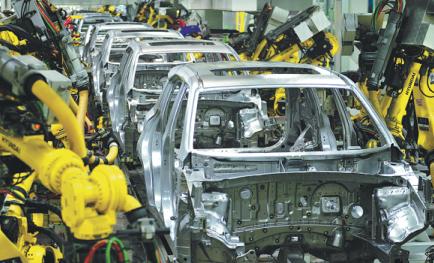In order to speed up the coordinated development of Beijing, Tianjin and Hebei province during the 13th Five-Year Plan period (2016-20), investment has substantially increased.
According to Ren Shiqiang, spokesman of the Beijing Bureau of Economy and Information Technology, a number of iconic investment projects are underway or have been completed in the past five years, which have helped to drive regional economic development.
These projects include automaker Beijing Hyundai's fourth factory in Cangzhou, Hebei province, which had a total investment of 7.4 billion yuan ($1.13 billion); a production and research and development base in which a Hebei subsidiary of Beijing Rail Transit Technology and Equipment Group invested 4.2 billion yuan; and an industrial park named after Beijing dairy brand Sanyuan which took up 1.8 billion yuan in investment.
To remove non-capital functions and speed up industrial restructuring, Beijing has removed 2,154 manufacturing companies and those deemed to be polluting, mainly focusing on machinery, construction materials and chemicals sectors during the period.
The Beijing government has released guidelines on the development of 10 high-end industries, including new-generation information technology, and made implementation plans for 5G, ultra-high-definition videos, robotics, new infrastructure and digital economy.
In August 2019, the three regions signed memorandums on further strengthening industrial development and setting up an industry integrated development mechanism for the Beijing-Tianjin-Hebei region.
Ren said that the three regions have accelerated industrial development focusing on high-end equipment and heavy chemical industries and set up the Beijing Caofeidian Development Zone.
The zone has attracted 12 large enterprises, including steelmaker Shougang Group and property developer BBMG.
Beijing has promoted the relocation of some businesses in the big data industry chain to a cloud-computing center in Zhangbei county in Hebei. To date, 22 projects have been signed with the center and five of them have been put into operation.
The regional integrated development has spurred the development of e-commerce. Tianjin Wuqing E-Commerce Industrial Park has attracted dozens of e-commerce companies.
Ren said Beijing has encouraged local industrial parks, trade associations and companies to invest in neighboring Tianjin and Hebei, and cooperate in organizing events, such as the China International Fair for Trade in Services, the World Intelligent Connected Vehicle Conference, the World Intelligence Conference and the China International Digital Economy Expo.
The three regions' IT authorities have signed an agreement on integrated development and strengthened collaboration in IT infrastructure construction and data sharing.
They have also established a regional unified social credit system to promote the construction of a corporate supervision mechanism in environmental protection, transportation, food safety, finance and tourism.
For the next Five-Year Plan period (2021-25), Beijing, Tianjin and Hebei will focus on IT, new energy intelligent vehicles, healthcare and build an integrated development industrial chain, Ren said.

Beijing Hyundai's auto plant in Cangzhou, Hebei province, costs 7.4 billion yuan in investment. YUAN LIWEI/XINHUA